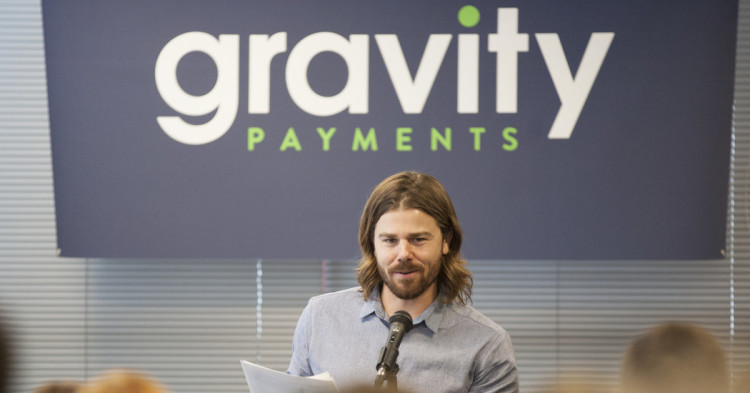THE $70,000 MINIMUM WAGE EXPERIMENT! * A Well Thought Out Scream by James Riordan

You remember Dan Price? He was the guy who decided to set a $70,000 minimum wage for his company, Gravity Payments which has created a simpler way to use a credit card to make purchases. The media went nuts when Price announce his company’s new “minimum wage”. Book publishers came calling as well as agents and reality show producers. Rush Limbaugh called him a socialist and Harvard Business School professors asked to study his radical experiment in paying workers.
The story is that it began with one of Price’s employees named Jason Haley. In 2011, Haley worked for Gravity as a phone tech and was making about $35,000 a year. One day Price noticed that Haley was in a bad mood and asked him about it. Haley, normally an easy-going, almost shy, employee, looked Price in the eye and said, “You’re ripping me off.”
Dan Price was shocked. He told Haley that his pay was based on market rates, but if he had information that was different, he’d be willing to listen.
Haley answered that it wasn’t about current market rates. “Your intentions are bad. You brag about how financially disciplined you are, but that just translates into me not making enough money to lead a decent life.”
Price waved it off, but for the next few days he couldn’t stop thinking about what Haley had said. He was proud of the way Gravity treated their employees and the incident made him feel horrible. Back when he was sixteen, Price had noticed how bar owners had to pay large credit fees every time they ran a credit card and he began to look for an alternative method. By 2004, he had found it and he and his brother Lucas formed Gravity Payments. Dan used his savings, credit card debt and even diverted some student loans to fund the startup. The company grew rapidly for the next eighteen months, but then Dan and Lucas had a falling out. They had been equal partners, but Lucas became frustrated at being given menial tasks by his little brother. By 2008, they agreed that Dan would become majority owner and Lucas is now an executive at the Seattle texting startup Zipwhip.
Gravity’s revenue hit $150 million in 2014 and was growing 15 percent per year on $7 billion in customer transactions. The company’s profits were $2.2 million which was below the industry average. Forty percent of those profits went to Dan and Lucas as dividends and the rest went back into the business. “We had a great culture and hundreds of people were applying for positions, so we could have gotten away with underpaying for a while longer,” he says.
Gravity had grown rapidly for four years but was nearly bankrupted by the recession and Price had tried to hold the wages down ever since. By 2011 Price was paying himself a million a year and, with a shock he realized that Haley was right. “I was so scarred by the recession,” Price said in an interview with Paul Keegan, “that I was proactively, and proudly, hurting my staff.” Price decided to change the way the company did business. He began giving 20% annual raises and noticed that his profit kept increasing despite the increased wage expense. This past April, he spent a couple of weeks figuring out financial projections based on his recent stats and then announced to his staff of 120 people (as well as The New York Times and NBC) that he was going to phase in a minimum wage of $70,000 for every Gravity employee. To insure it would work, he was cutting his own salary to that same level. That meant that Price went from making a guaranteed 1.1. million per year to $70,000, just like every other employee.
Price’s action created a media tidal wave. Here was this young, good looking entrepreneur putting it all on the line and betting that happier employees would increase his company’s profits. While some people screamed “Socialism”, others realized that making such a bold move was at the very heart of Capitalism.
 The decision generated half a billion interactions on social media and the NBC video of the announcement became the most shared in network history. Other bosses all over the world began giving out raises like Ebenezer Scrooge on Christmas morning. Not surprisingly, every person with a good resume begin seeking employment at Gravity including 4,500 in the first week!
The decision generated half a billion interactions on social media and the NBC video of the announcement became the most shared in network history. Other bosses all over the world began giving out raises like Ebenezer Scrooge on Christmas morning. Not surprisingly, every person with a good resume begin seeking employment at Gravity including 4,500 in the first week!
Tammi Kroll, 52, a high-powered Yahoo executive quit her job and in September went to work for Gravity even though her new salary was an 80% pay cut. “I spent many years chasing the money,” she said. “Now I’m looking for something fun and meaningful.” Price received an offer from The Apprentice reality-show impresario Mark Burnett to be the new Donald Trump on a show called Billion Dollar Startup.
Shortly after the announcement, brother Lucas sued him, claiming Dan had previously paid himself “excessive compensation” and asked the court to order Dan to buy Lucas’s 30 percent share of Gravity “at fair value” or dissolve the firm. Dan denies these claims.
Dan Price has sold all his stocks, emptied his retirement accounts, and mortgaged his two properties — including a $1.2 million home with a view of Puget Sound and put three more million into Gravity. As majority owner, he is very well off, but if Gravity falls, so does Price. “Most people live paycheck to paycheck,” he says. “So how come I need 10 years of living expenses set aside and you don’t? That doesn’t make any sense. Having to depend on modest pay is not a bad thing. It will help me stay focused.”
The 20 percent raises that he announced in 2012 going to be a one-time deal and when profits rose because of a 35% productivity increase, Price chalked it up as being a fluke, but when he did another 20 percent raise the following year, profits rose again. He did the same raise increase 2014 and profits went up again but not quite at the same level, primarily because Gravity had to do more hiring.
This past March, Price spoke with a good friend who earned less than $50,000 at another company. She worked 50 to 60 hours a week, but her rent was increased $200 a month, and she was battling with student debt and worried about covering her expenses. “I was so angry,” Price said. “Here I am walking around making $1 million a year, and I’m working shoulder to shoulder with people in her situation who are every bit as good and valuable as I am.”
Price is a numbers guy, and he took note that even though the nation’s productivity has improved 22 percent since 2000, median wages have risen only 1.8 percent, when you adjust them for inflation. Since the recession wages have fallen by 3 percent while, productivity gains are mostly benefiting the CEOs who earn an average of about 300 times what the typical workers earn, In 1990 this figure was 71.2 times according to the Economic Policy Institute. Incidentally, Price’s $1.1 million salary was about 23 times the $48,000 average salary at Gravity. “I began wondering what my friend would have to make so she wouldn’t have to worry about a $200 rent hike,” says Price. He recalled a 2010 study by Princeton behavioral economist Daniel Kahneman finding that, while people did not feel happier on a daily basis as their income rose above $75,000, they were decidedly unhappier the less they earned below $75,000. At Gravity, new hires made $35,000 a year.
Price began to worry that employees with money troubles would fall short of the exemplary service that had made Gravity so successful. He decided that low starting salaries were simply wrong and contrary to the values his father had always taught him to respect. “I just decided I’m gonna do $70,000,” he said. “I don’t care if I have to stop paying myself or I have to work 20 hours a day. I’m going to do it.”
The plan will eventually double the salaries of thirty workers and give raises to forty more making less than $70,000. Phased in over three years, this will cost $1.8 million. The minimum jumped to $50,000 immediately and will climb by $10,000 in each of the next two years; those who earn $50,000 to $70,000 will get $5,000 raises. Price has vowed not to raise prices, lay off staff, or cut executive pay. More than half the cost will be offset by Price’s pay cut. Unless revenue grows, the rest will be covered by that $2.2 million profit, leaving little margin for error.
Since that April made-for-TV moment, Price has had no second thoughts. He has seen employees like Garret Nelson, 31, a salesman in Boise, Idaho, whose raise allowed him to pay for teaching supplies and music lessons for his five homeschooled kids. “People back in Idaho said he was nuts,” says Nelson, who went to middle school with Price. “But it really energized the employees.”
Price maintains that setting a $70,000 minimum wage was a moral imperative, not a business strategy. Of course, he now must prove the business wisdom behind it to achieve his long-term goal of transforming the business world. “I want the scorecard we have as business leaders to be not about money, but about purpose, impact, and service,” he says. “I want those to be the things that we judge ourselves on.”
Rest assured, the business world is watching. Dan’s experiment will one day be universally regarded as a stroke of genius, indicating that most employees are grossly underpaid or as proof positive that you can’t rock the corporate boat and get away with it.
___






No Comment